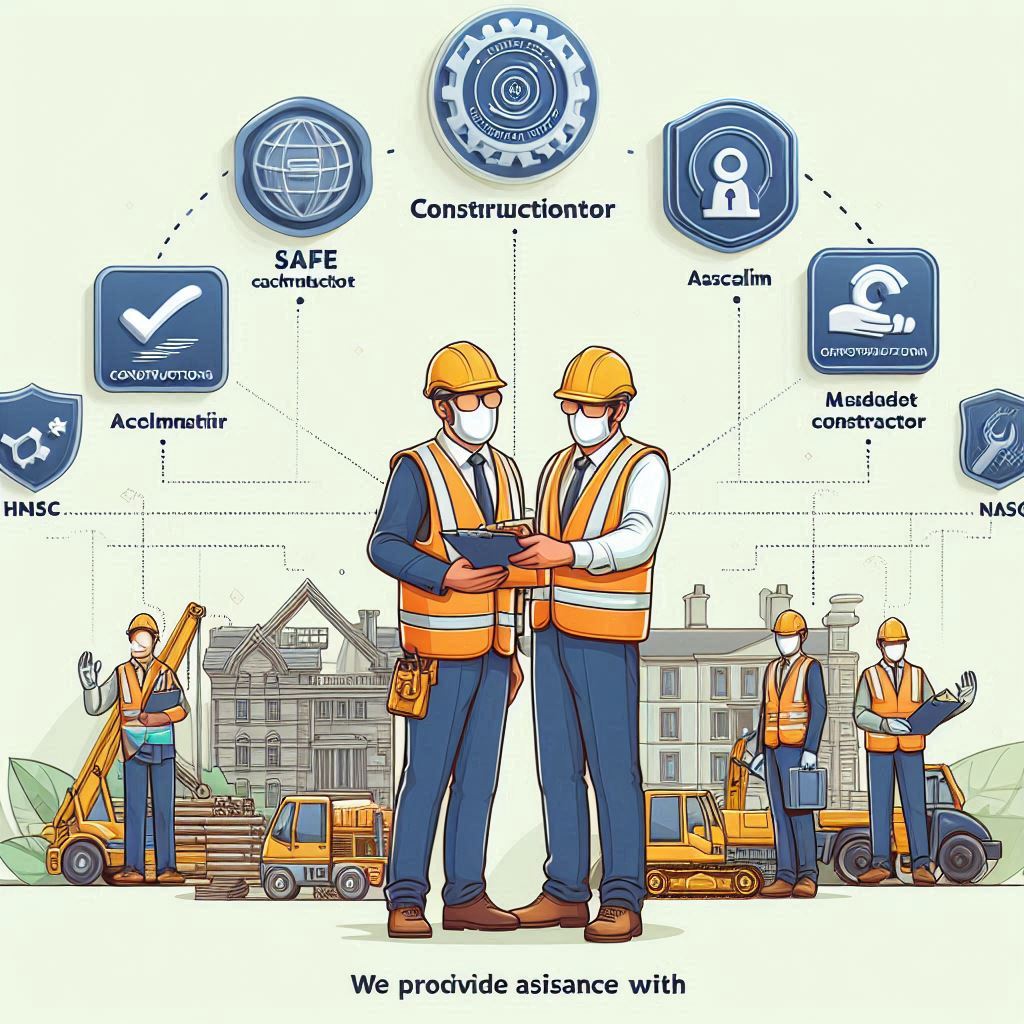Essential Construction Safety Accreditations: What You Need to Know
In today’s highly regulated construction industry, safety accreditations are no longer optional extras—they’re essential credentials that demonstrate your company’s commitment to maintaining the highest standards of health and safety. These third-party validations not only help you win contracts but also ensure you’re maintaining robust safety management systems that protect your workers and comply with legislation.
This guide explores the most important accreditations in the construction industry, explaining what they are, why they matter, and how they can benefit your business. Whether you’re a contractor looking to enhance your pre-qualification credentials or a client wanting to understand what certifications to look for, this information will help you navigate the complex landscape of construction safety accreditations.
CHAS Accreditation
The Contractors Health and Safety Assessment Scheme (CHAS) is one of the founders of third-party accreditation. CHAS was created by experienced health and safety professionals in 1997 to improve health and safety standards across the UK.
CHAS helps contractors and supply chain management companies demonstrate their health and safety capability to potential clients. It reduces duplication in safety pre-qualification by standardizing requirements and streamlining the process.
Companies with CHAS accreditation demonstrate compliance with health and safety legislation, industry standards, and a commitment to maintaining excellent safety management practices.
Safe Contractor Accreditation
SafeContractor is a leading health and safety pre-qualification assessment scheme used by contractors and service providers to showcase their capability to potential clients. The SafeContractor certificate demonstrates that businesses have been independently assessed and meet required standards in health and safety management.
The scheme is particularly valuable for organizations that want to demonstrate their commitment to maintaining excellent health and safety management standards. The Safe Contractor certificate is widely recognized and accepted across various industries, making it a valuable credential for businesses seeking to expand their client base.
SafeContractor audits evaluate a company’s health and safety documentation, ensuring compliance with current legislation and industry best practices.
Constructionline Accreditation
Constructionline is the UK’s largest register for pre-qualified contractors and consultants. It collects, assesses, and monitors standard company information through a question set that is aligned to PAS 91, the standardized pre-qualification questionnaire developed by BSI.
With different membership levels (Silver, Gold, and Platinum), Constructionline offers varying degrees of verification. As contractors move up the levels, they undergo more rigorous assessments covering areas beyond health and safety, including environmental management, quality management, equal opportunities, and modern slavery.
For buyers, Constructionline simplifies the supplier selection process, reducing risk and creating a more efficient procurement process. For suppliers, it means reduced time and cost associated with completing multiple pre-qualification questionnaires.
NASC Accreditation
The National Access and Scaffolding Confederation (NASC) is the UK’s scaffolding trade body. Established in 1945, NASC is committed to raising industry standards for scaffolding and access provision.
NASC membership demonstrates that scaffolding contractors meet rigorous standards in areas including safety, technical capability, training, and business integrity. Members undergo regular audits to ensure ongoing compliance with NASC requirements.
NASC produces a wide range of industry guidance for scaffolding contractors, establishing standards that are widely recognized as representing best practice. Many construction sites and projects specifically require NASC accredited scaffolding contractors to ensure the highest levels of scaffolding safety and quality.
RISQS Accreditation
The Railway Industry Supplier Qualification Scheme (RISQS) is the supplier pre-qualification service used by buyers of products and services throughout the GB rail industry. RISQS provides a single common registration, qualification, and audit process for suppliers that is shared by the rail industry.
RISQS accreditation demonstrates that a company meets the specific standards required to work safely in the rail environment. It covers areas such as safety management, quality, environmental capability, and technical ability.
RISQS is administered by Network Rail and the Rail Safety and Standards Board (RSSB) and is an essential credential for contractors seeking to work on rail infrastructure projects. It ensures that suppliers can demonstrate the specific capabilities and compliance required in this highly regulated industry.
SMAS Accreditation
Safety Management Advisory Services (SMAS) provides a health and safety assessment scheme that evaluates a contractor’s health and safety capability. The SMAS Worksafe Contractor certification demonstrates compliance with health and safety regulations and industry best practices.
SMAS accreditation is recognized by the Safety Schemes in Procurement (SSIP) forum, which means it is accepted by other SSIP member schemes through mutual recognition. This reduces the need for multiple assessments and streamlines the pre-qualification process.
SMAS assessments evaluate a company’s health and safety policy, risk assessments, method statements, and overall safety management system. The scheme is suitable for contractors of all sizes and across various sectors in the construction industry.
Key Benefits of Safety Accreditations
Enhanced Credibility and Reputation
Accreditations demonstrate your commitment to maintaining high safety standards, enhancing your reputation in the industry.
Competitive Advantage
Many clients require specific accreditations as prerequisites for tendering. Having these certifications opens doors to more contract opportunities.
Simplified Pre-qualification
Most accreditations offer mutual recognition through SSIP, reducing the need for multiple assessments and streamlining the bidding process.
Improved Safety Performance
The process of obtaining and maintaining accreditations helps companies identify weaknesses and implement more robust safety management systems.
Risk Reduction
Accredited companies typically experience fewer workplace accidents, reducing the risk of financial, legal, and reputational damage.
Conclusion
Safety accreditations are far more than just certificates on your office wall—they’re powerful business tools that demonstrate your commitment to excellence, open doors to new opportunities, and help protect your workforce. While obtaining these accreditations requires investment of time and resources, the benefits they bring in terms of competitive advantage, streamlined pre-qualification, and improved safety performance make them well worth pursuing.
When selecting which accreditations to pursue, consider your target market and client requirements. For general construction work, accreditations like CHAS, SafeContractor, and SMAS provide excellent coverage, while specialized work may require industry-specific credentials like NASC for scaffolding or RISQS for railway projects.



![[Talk US] How do I contact Coinbase Service Customer Number?](https://bioneerslive.org/wp-content/uploads/2025/05/expedia-customer-service-numberqFGG9Fh-270x162.jpg)